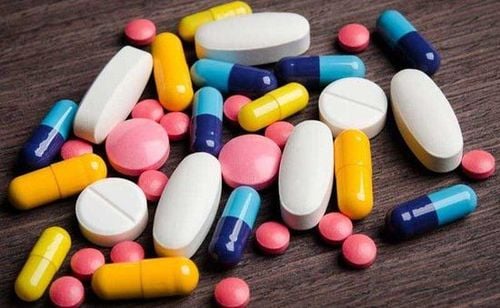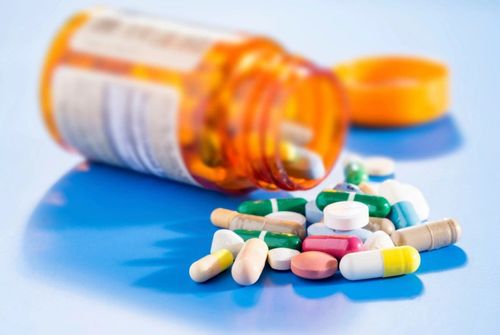This is an automatically translated article.
Ampicillin has broad bactericidal activity against many gram-positive and gram-negative aerobic and anaerobic bacteria. It acts through inhibition of cell wall mucopeptide biosynthesis during the active replication phase. In addition, Ampicillin is an antibiotic used to prevent and treat certain bacterial infections, or to prevent group B strep infections in infants.1. Ampicillin sodium Vial
Ampicillin is a broad spectrum antibiotic used to treat a wide variety of bacterial diseases. It is an antibiotic of the Penicillin group, the mechanism of action is to prevent the growth of bacteria.
Medicines are only for the treatment of bacterial infections. It will not work for viral infections (like the common cold, flu). Using any antibiotic when it's not really needed can make it ineffective for infections that can even lead to resistance later in life.
2. Uses of ampicillin sodium Vial
Because it is a broad-spectrum antibiotic, Ampicillin (active ingredient is ampicillin sodium Vial) is effective against many different types of infections, including quite fully as follows:
Heart valve infections caused by Streptococcus Food poisoning caused by Streptococcus bacteria Salmonella Enteric infections caused by Shigella bacteria Typhoid fever Pharyngitis and tonsillitis Meningococcal meningitis Blood infections caused by Streptococcus bacteria Blood infections caused by Staphylococcus aureus Bacteria Escherichia coli in the blood Bacterial blood poisoning Proteus Enterococcus bacteremia A systemic inflammatory response called bacteremia caused by Salmonella infection Pneumococcus Meningococcal E. coli Bacterial meningitis Valve infection Bacterial heart valve infection Enterococcus bacteria Epiglottitis Streptococcal infection of the epiglottis Pneumonia caused by Haemophilus influenzae Bacterial pneumonia caused by Streptococcus Bacterial pneumonia caused by bacteria a by Staphylococcus Bacterial pneumonia Bacterial infections with chronic bronchitis Infection prevention for stomach or intestinal surgery Genital or urinary tract infections Bacterial urinary tract infections Infection prevention during vaginal hysterectomy Skin and subcutaneous tissue infections Prevention of infection during cesarean section Fever of unknown cause in infants Anthrax bacterial pneumonia Stomach or intestinal bacterial infection anthrax infection Brain or spinal cord infections caused by anthrax Infections throughout the body from Listeria monocytogenes Infections caused by Listeria monocytogenes Infections of the brain/spinal cord caused by Listeria monocytogenes Heart infections caused by Listeria monocytogenes Blood poisoning caused by Listeria monocytogenes Infections Listeria skin infection Yersinia pseudotumor tuberculosis infection Fetal Campylobacter infection Haemophilus influenzae Haemophilus influenzae Anthrax Blood infection Treatment to prevent a bacterial heart valve infection Blood or tissue infection affecting the whole body of the infant Pneumonia in the neonate Acute bacterial infection of the sinuses Necrotizing enterocolitis Biliary tract infection Infectious arthritis caused by bacteria Listeria Bone infections caused by Listeria bacteria Prevention of group B strep infections in infants Infections of the infant's meninges and/or spinal cord Haemophilus infection of the heart valves
3. How to take Ampicillin Sodium Vial
The drug is produced in the form of a powder packed in a glass vial, when injected, it is necessary to add distilled water for injection. It is indicated for intravenous injection, intramuscular injection or intravenous infusion phase under the supervision of a doctor. The drug is currently used in medical facilities.
Ampicillin Sodium Vial is prescribed based on the patient's weight and medical condition. Depending on the severity of the disease, the doctor will prescribe the appropriate dose and duration of use for each patient.
For the best effect, the injection should be given at a certain time of the day, and continue to inject until the end of the prescribed time even if the symptoms have disappeared. Do not stop injecting yourself without consulting your doctor.

Ampicillin Sodium Vial được chỉ định dựa theo cân nặng của bệnh nhân và tình hình bệnh lý
4. Side effects
Although this is a very benign antibiotic, it does not mean that it does not have side effects. Here are some side effects of the drug:
4.1. Common side effects
Yeast infections in the vagina and vulva Diarrhea, digestive disorders Headache Nausea or vomiting
4.2. Side effects rarely occur
Anaphylaxis Drug allergy Low blood pressure Skin rash and peeling Difficulty breathing Stomatitis (swollen, painful mouth sores)

Một số tác dụng phụ của thuốc Ampicillin Sodium Vial
4.3. Side effects are rare but cannot be ignored
Skin disorders: blistering and peeling of the skin known as Stevens-Johnson Syndrome, or toxic epidermal break downs Constriction of the larynx Angioedema Hemolytic anemia Depletion of all types of blood cells called leukopenia Interstitial nephritis Severe allergic skin reaction called DRESS syndrome Skin disorder known as acute generalized exocrine pustulosis Elevated liver enzymes Abnormal peeling Skin thrombocytopenia Blood platelets Clostridium difficile infection Increased blood eosinophils Increased risk of bleeding due to coagulopathy incontinence Puffy face due to fluid retention Convulsions The appearance of crystals in the urine Thrombophlebitis , an inflamed vein caused by a hematoma Immediately notify your doctor or go to the nearest facility if you notice the following: expression above.
5. Drug interactions
Before being told to use drugs by your doctor, tell your doctor about all the medicines you are taking. For Ampicillin Sodium Vial, drugs that can cause interactions are: methotrexate, tetracyclines, warfarin.
Ampicillin may cause false positive results with some diabetic urinalysis products (cupric sulfate type)
6. Notes when using drugs
Before using all of the antibiotics mentioned and using Ampicillin Sodium Vial in particular, tell your doctor about your history of allergies to any agent. Also provide more information about your comorbidities, especially kidney disease, infectious mononucleosis. Ampicillin may make live bacterial vaccines (such as typhoid vaccine) inactive. Do not have any immunizations/vaccinations while using this medication unless directed to do so by your doctor. The drug is eliminated by the kidneys, so elderly people may be sensitive to this antibiotic because their kidney function has declined over time. The drug should be used during pregnancy only when absolutely necessary and under the supervision of a doctor. The drug is also partially excreted in the urine, so if you are breastfeeding, inform your doctor. Do not share this medicine with others. The medicine is only for your current infection, do not use it for other infections in the future without your doctor's approval. Get medical help right away if you experience: severe vomiting, persistent diarrhea, unusual changes in the amount of urine, or seizures
Please dial HOTLINE for more information or register for an appointment HERE. Download MyVinmec app to make appointments faster and to manage your bookings easily.
Reference source: webmd.com













